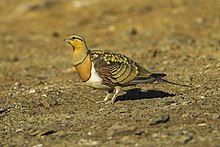Columbimorphae
| Columbimorphae Temporal range:
| |
|---|---|

| |
| Pin-tailed sandgrouse (Pterocles alchata) | |
| Scientific classification | |
| Domain: | Eukaryota |
| Kingdom: | Animalia |
| Phylum: | Chordata |
| Class: | Aves |
| Clade: | Neoaves |
| Clade: | Columbimorphae Latham, 1790 |
| Clades | |
| |
Columbimorphae is a clade/superorder discovered by genome analysis that includes birds of the orders Columbiformes (pigeons and doves), Pterocliformes (sandgrouse), and Mesitornithiformes (mesites).[2][3] This group was defined in the PhyloCode by George Sangster and colleagues in 2022 as "the least inclusive crown clade containing Columba oenas, Mesitornis variegatus, and Pterocles alchata".[4] Previous analyses had also recovered this grouping,[5][6][7] although the exact relationships differed. Some studies indicated a sister relationship between sandgrouse and pigeons (the traditional view)[6][8][9] while other studies favored a sister grouping of mesites and sandgrouse instead.[7] This sister relationship of the sandgrouses and mesites was named by George Sangster and colleagues in 2022 as the clade Pteroclimesites and defined in the PhyloCode as "the least inclusive crown clade containing Mesitornis variegatus and Pterocles alchata".[4]
| Columbimorphae |
| ||||||||||||
In 2020 Kuhl et al. sequenced 3-prime untranslated region (3’UTR) from 429 species and 379 genera of birds.They have found that cuckoos are the sister group to pigeons within Columbimorphae as shown in the cladogram below:[10]
| Columbimorphae |
| ||||||||||||||||||
This is unlike most studies, which consider cuckoos to be related to turacos and bustards (part of the clade Otidimorphae). The six orders in Columbimorphae and Otidimorphae are sometimes considered to form a clade, Columbaves.
References
[edit]- ^ Sangster, G.; Braun, E.L.; Johansson, U.S.; Kimball, R.T.; Mayr, G.; Suh, A. (2022). "Phylogenetic definitions for 25 higher-level clade names of birds". Avian Research. 13: 100027. Bibcode:2022AvRes..1300027S. doi:10.1016/j.avrs.2022.100027.
- ^ Jarvis, E.D.; et al. (2014). "Whole-genome analyses resolve early branches in the tree of life of modern birds". Science. 346 (6215): 1320–1331. Bibcode:2014Sci...346.1320J. doi:10.1126/science.1253451. PMC 4405904. PMID 25504713.
- ^ Prum, R.O.; Berv, J.S.; Dornburg, A.; Field, D.J.; Townsend, J.P.; Lemmon, E.M.; Lemmon, A.R. (2015). "A comprehensive phylogeny of birds (Aves) using targeted next-generation DNA sequencing". Nature. 526 (7574): 569–573. Bibcode:2015Natur.526..569P. doi:10.1038/nature15697. PMID 26444237. S2CID 205246158.
- ^ a b Sangster, George; Braun, Edward L.; Johansson, Ulf S.; Kimball, Rebecca T.; Mayr, Gerald; Suh, Alexander (2022-01-01). "Phylogenetic definitions for 25 higher-level clade names of birds" (PDF). Avian Research. 13: 100027. Bibcode:2022AvRes..1300027S. doi:10.1016/j.avrs.2022.100027. ISSN 2053-7166.
- ^ Ericson, P. G.P; Anderson, C. L; Britton, T.; Elzanowski, A.; Johansson, U. S; Kallersjo, M.; Ohlson, J. I; Parsons, T. J; Zuccon, D.; Mayr, G. (2006). "Diversification of Neoaves: integration of molecular sequence data and fossils". Biology Letters. 2 (4): 543–547. doi:10.1098/rsbl.2006.0523. PMC 1834003. PMID 17148284.
- ^ a b Hackett, S. J.; Kimball, R. T.; Reddy, S.; et al. (2008). "A phylogenomic study of birds reveals their evolutionary history" (PDF). Science. 320 (5884): 1763–1768. Bibcode:2008Sci...320.1763H. doi:10.1126/science.1157704. PMID 18583609. S2CID 6472805.
- ^ a b Yuri, T.; et al. (2013). "Parsimony and Model-Based Analyses of Indels in Avian Nuclear Genes Reveal Congruent and Incongruent Phylogenetic Signals". Biology. 2 (1): 419–444. doi:10.3390/biology2010419. PMC 4009869. PMID 24832669.
- ^ Livezey, Bradley C.; Zusi, Richard L. (2007). "Higher-order phylogeny of modern birds (Theropoda, Aves: Neornithes) based on comparative anatomy. II. Analysis and discussion". Zoological Journal of the Linnean Society. 149 (1): 1–95. doi:10.1111/j.1096-3642.2006.00293.x. PMC 2517308. PMID 18784798.
- ^ Gibb, Gillian C.; Penny, David (2010). "Two aspects along the continuum of pigeon evolution: A South-Pacific radiation and the relationship of pigeons within Neoaves". Molecular Phylogenetics and Evolution. 56 (2): 698–706. doi:10.1016/j.ympev.2010.04.016. PMID 20399870.
- ^ Kuhl., H.; Frankl-Vilches, C.; Bakker, A.; Mayr, G.; Nikolaus, G.; Boerno, S. T.; Klages, S.; Timmermann, B.; Gahr, M. (2020). "An unbiased molecular approach using 3'UTRs resolves the avian family-level tree of life". Molecular Biology and Evolution. 38: 108–127. doi:10.1093/molbev/msaa191. PMC 7783168. PMID 32781465.



